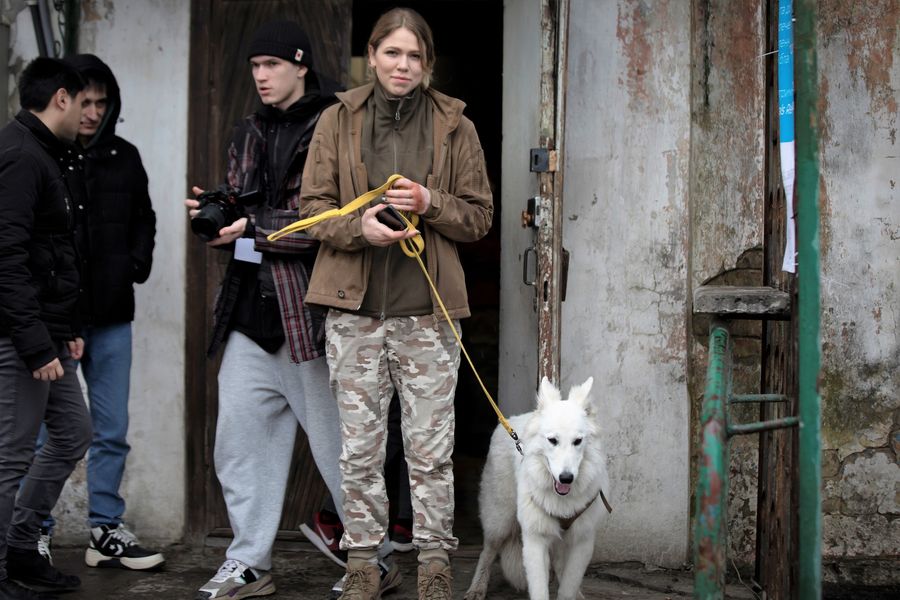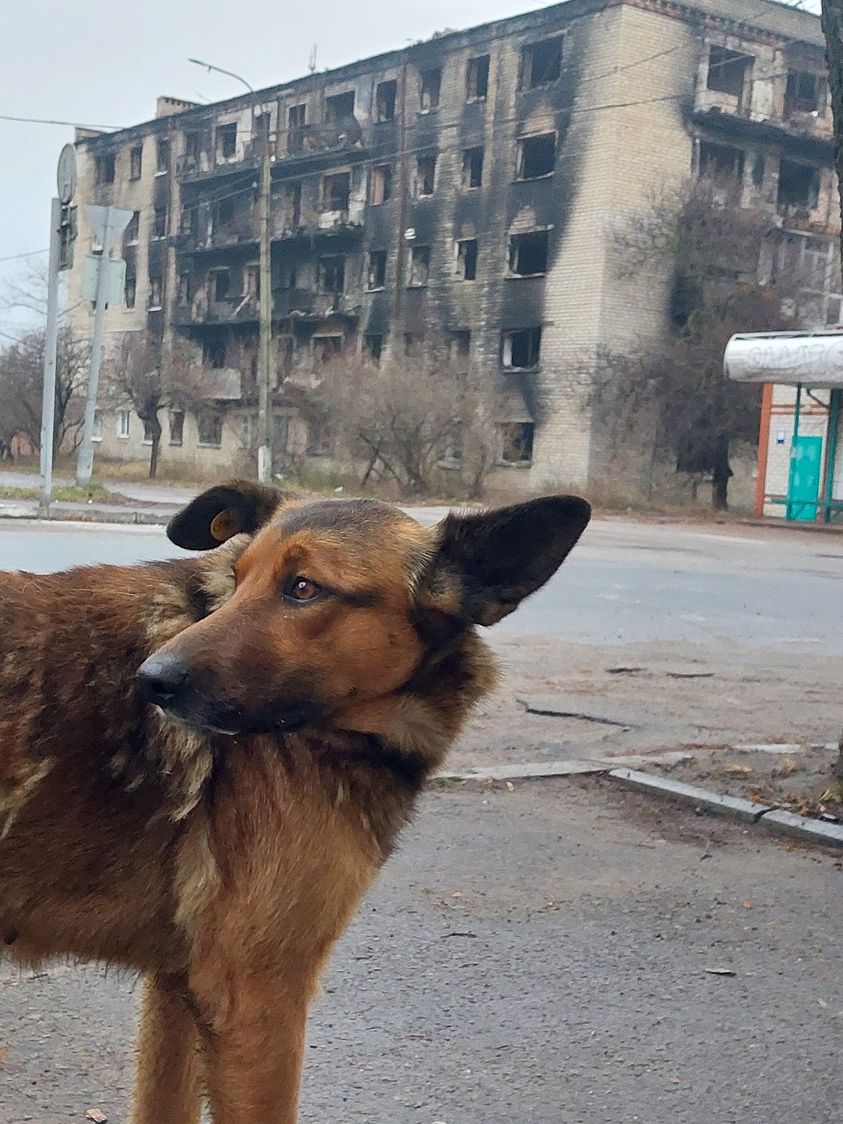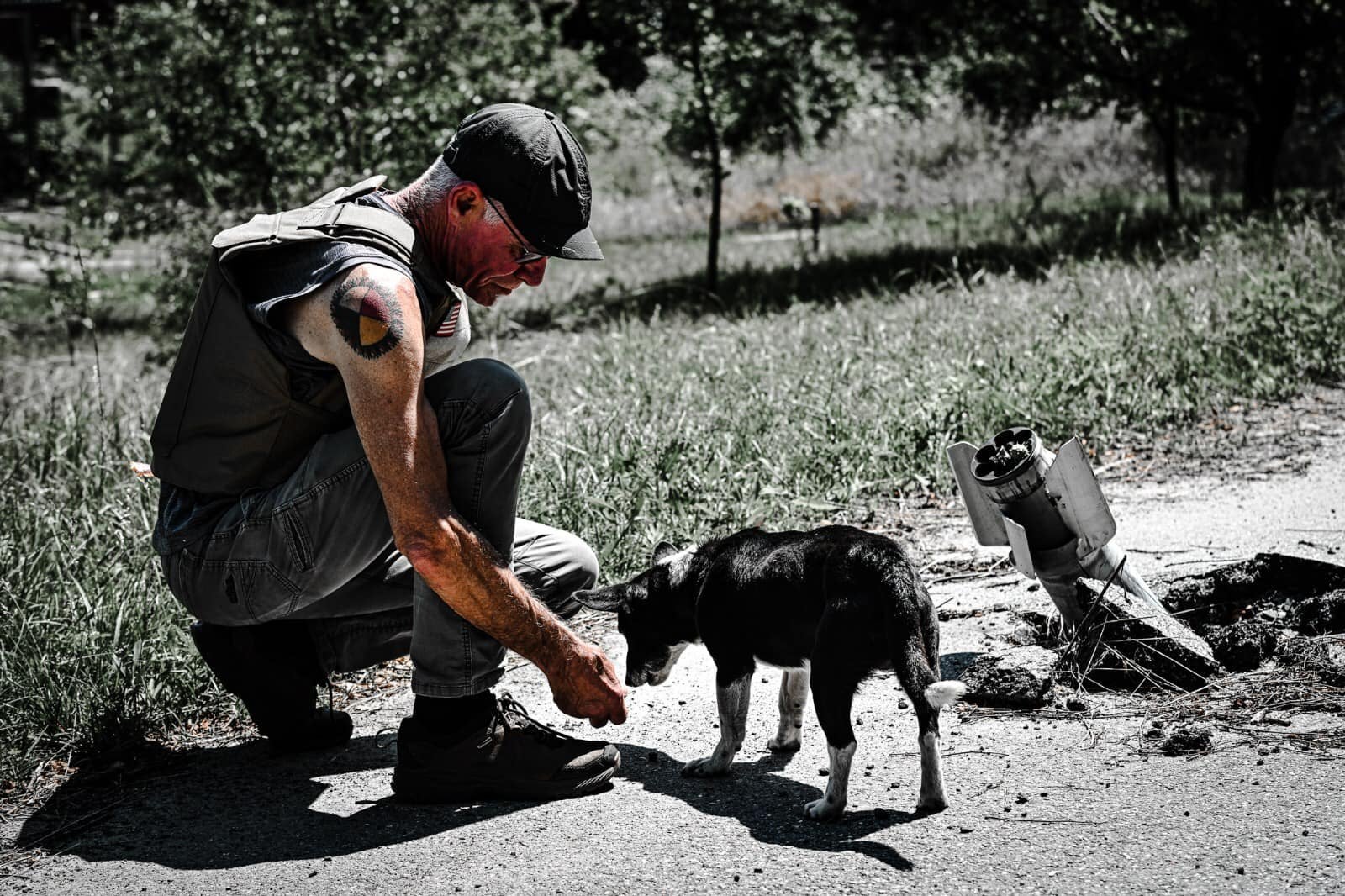The war against rabies in Ukraine and the race to stop it crossing borders
A disease which has been largely eradicated from Europe, rabies is suddenly raising its head in Ukraine where millions of abandoned pets are now running wild. Ahead of a film exposing the public health crisis, Joe Shute talks to Khrystyna Drahomaretska who caught the disease during her work inoculating feral cats and dogs roaming the streets in the wartorn country

Over the past two years operating along the Ukrainian front line, Khrystyna Drahomaretska has gained a veteran’s understanding of the battle tactics employed by the invading Russian troops. During the day, the 27-year-old explains, they will freely dispatch cheap kamikaze drones to kill anyone on sight. At night, however, the high-value drones equipped with hi-tech sensors are used more sparingly to target vehicles instead.
That was the calculation she made two weeks ago while conducting a daring night-time rescue operation a few hundred metres from the Russian positions near the city of Vovchansk in the Kharkiv region where Putin’s forces are currently pushing towards.
Mindful of the night vision drones, she ditched her van and crept towards her target on foot. But the enemy started firing anyway, with more than a dozen missiles launched towards her position. Hiding behind a copse of trees, one exploded nearby sending a knuckle-sized piece of shrapnel searing straight through her leg.
Khrystyna applied a tourniquet and was taken to a nearby army base before being transported back to a hospital in Kharkiv where thankfully she was told the damage was just muscle and tissue. “The doctors told me I should spend one month in hospital on a bed but I said that’s impossible,” Khrystyna says. In the end, she discharged herself after two days; her mission was too vital for her to rest.
That mission is not some clandestine military operation, but rescuing and treating pets. Khrystyna is part of a network of civilian volunteers risking life and limb to combat one of the lesser-known catastrophes of the Russian invasion of Ukraine, but one that is rapidly mushrooming into a public health crisis which could cross borders.
Since the war started, more than 10 million Ukrainians have fled their homes. A nation of animal lovers, it is estimated at least 30 per cent of those displaced were forced to abandon a pet, resulting in an explosion in the population of feral cats and dogs roaming the streets. More than a million dogs alone are now estimated to live wild on the streets leading to rapidly rising numbers of rabies infections.
And as animals have no borders, last year a group of veterinarians from across Europe called Visegrad Vet Plus issued a call to action over the fear of a mass rabies outbreak spilling over into Europe. A disease which still kills tens of thousands each year, mainly in Africa and Asia, but which has been largely eradicated from Western Europe (the last case of human rabies in the UK acquired from an animal other than a bat was in 1902) is suddenly rearing its head.
Over the past 12 months, according to figures cited by the World Health Organisation from the Ukraine Ministry of Health, the country has recorded a “significant increase” in the number of humans bitten by both domestic and wild animals. Meanwhile, the number of emergency rabies prophylaxis treatments administered to bite victims has surged by more than 40 per cent throughout 2023.
Previously the Ukrainian authorities operated a successful vaccination campaign for domestic animals, however this vaccine coverage has now plummeted. To compound matters, there is currently a global shortage of the rabies vaccine as demand outstrips supply. In Ukraine, where Russian bombs have levelled health facilities, this is particularly acute.

According to government figures, only one person in Ukraine has died as a result of rabies in 2024 (although given the crisis in the country many cases and deaths in the human population could be going unreported). Rabies has a fatality rate of 100 per cent without prompt treatment and there are fears that, unless urgent action is taken to reduce the street dog population, the situation could soon spiral.
This is where Khrystyna comes in. Alongside an organisation called Ukraine War Animals Relief Fund (UWARF) she is working to sterilise, vaccinate and microchip feral dogs and cats left behind as a result of the war.
Such is the size of their population and prodigious rate of breeding that it is a race against time. Daniel Fine, a retired Canadian tech executive who established UWARF has filmed Khrystyna and the “vet army” working in Ukraine for a new documentary on the crisis. They need to treat 500,000 animals over the next five years in order just to flatten the curve of infection. “It is the perfect storm,” the 65-year-old says ahead of the premiere of his film called War Tails, being shown in London on 4 June.
I haven’t counted how many times I’ve been bitten but it’s close to 100. If you will see my hands and legs, they carry a lot of scars
Prior to the war breaking out, Khrystyna was living the life of any urban twentysomething. She was working as an architect, having graduated from the Odessa Academy of Civil Engineering and Architecture and living alone in an apartment in her home city of Podilsk. Aside from her work, her main hobby was rescuing street dogs and finding them a new home to live in.
When war broke out she considered becoming a sniper, but due to being blind in one eye was immediately ruled out on medical grounds. Instead, she was close to joining a special reconnaissance unit which targeted Russian troops in night-time operations. Even amid such gruesome conflict, the unit has a particularly high attrition rate, but Khrystyna was not put off by that. She says she isn’t someone who has ever felt afraid.
Instead, given her aptitude and enthusiasm for rescuing dogs, she was persuaded by Fine (who met her in 2022 after travelling to Ukraine to assist in efforts to protect the country’s abandoned pet population) to join UWARF in its mission. Friends of hers have been killed and lost limbs fighting on the front line, but her work is equally perilous.

In January, Khrystyna was infected with rabies from the saliva of a dog which had attacked several people in a market in Ukraine’s Donetsk region. The frothing mouth is a telltale sign of infected animals which Khrystyna and the team she works with have encountered on many occasions.
Fortunately, she had been vaccinated and the treatment worked. “I haven’t counted how many times I’ve been bitten but it’s close to 100,” she says. “If you will see my hands and legs, they carry a lot of scars.”
We are talking via video call with Khrystyna parked on a street in the city of Odessa. She is wearing a Puma tank top, a band in her blonde hair and green fingernail polish. “I want to show you something,” she says, panning the camera out behind her to reveal a pack of at least a dozen street dogs of all shapes and sizes crammed into the back of her small Mercedes GLA car. “I don’t know how many dogs actually are here,” she admits. “A lot...”
The car was gifted to Khrystyna four years ago as a present from her parents [who still live in her home city] – a lifetime ago for all Ukrainians – and she admits that it has since been “destroyed” through her work. “My parents thought it would be better if I stayed in architecture,” she admits. “But my heart wants to do this job. I’m happy that I’ve found my place.”
She has no partner to worry about her, but is accompanied everywhere she goes by her trusty dog Milady, a white Swiss shepherd.

The animals Khrystyna rescues are either rehomed or inoculated and sterilised and then released back out on the streets. Fine explains that euthanasia is decreed a sin among Ukraine’s majority Orthodox Christian population. He says one vet working with UWARF nearly had to leave the country after euthanising a stricken cat which had no chance of survival.
With many animal shelters filled to the brim even before the war, Khrystyna has set up her own shelter in a village near her home city called The Place Under The Sun. Currently she has around 150 dogs living in the shelter and is constantly seeking new homes in Kyiv and across Europe. Several UK families have adopted dogs rescued by Khrystyna.
Aside from raising awareness of their plight, Fine hopes that the film – which is also being screened at the Seattle Film Festival – will persuade EU leaders to act urgently to address the crisis which could quite easily cross over into their borders.
As for Khrystyna, the work goes on, driving night and day to collect dogs and all the while racing to get a grip on a surging animal population. But she insists she remains undaunted by the scale of the task. Like her fellow Ukrainians fighting back the tides of Russian troops pouring over the border, she says, “of course we have to hold on to hope”.
‘War Tails’ is being screened at the Genesis Cinema in London at 6.30pm on 4 June. For those interested in adopting a dog from Ukraine, visit warpaws.org or k9-rescue.org
Join our commenting forum
Join thought-provoking conversations, follow other Independent readers and see their replies
Comments

Bookmark popover
Removed from bookmarks